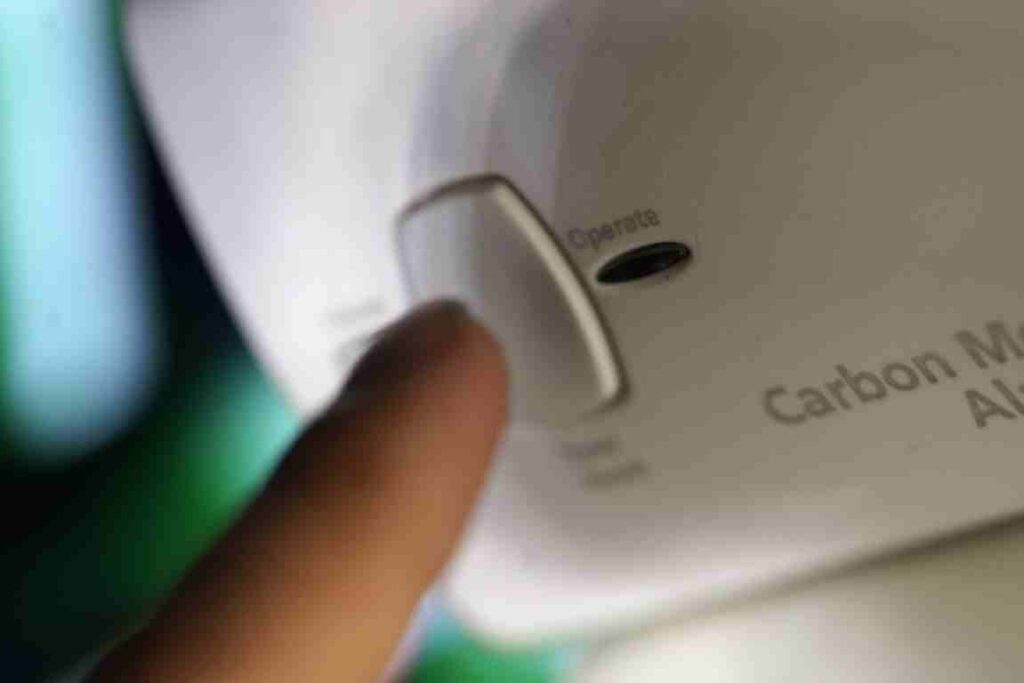If you’ve ever had the carbon monoxide detector in your RV go off for seemingly no reason, you’re not alone. It can be especially frustrating when your carbon monoxide detector goes off in the small confines of your RV. But do farts and perfume actually set off the CO detector?
As it turns out, farts and perfume can definitely set off your carbon monoxide detector in your RV. In addition, RVers have reported that Lysol, pine sol, hairspray, cleaning solvents, litterboxes, and potatoes set off their CO detector. Also, a low battery can set off the CO detector.
When Farts Set off Carbon Monoxide Detectors

One RVer and her husband were caught off guard when their dog let out a stinky fart while lounging near the CO detector, setting off a cacophony of blaring alarms.
The dog, just as surprised as her humans, jumped up and barked in confusion while the RVer and her husband struggled to contain their laughter.
The CO detector was blaring loudly, and their dog looked around with wide eyes as if trying to understand how her own gas could have caused such a commotion. The RVer and her husband quickly reset the CO detector, but the laughter continued to erupt as they realized the absurdity of it all.
What Causes a Fart to Set off CO Detectors?
Farts are primarily composed of gases like nitrogen, oxygen, carbon dioxide, and small amounts of other gases. When a person passes gas, the released gases, including carbon dioxide (CO2), can potentially set off carbon monoxide (CO) detectors or other gas detectors, depending on their sensitivity and the concentration of gases in the surrounding air.

Carbon monoxide (CO) detectors are designed to detect the presence of carbon monoxide, a poisonous gas that can be produced by the incomplete combustion of fuels like gas, oil, wood, or propane. However, some CO detectors may also be sensitive to other gases, including carbon dioxide (CO2), which is a normal component of exhaled breath and flatulence.
If a person (or a dog) passes gas in close proximity to a CO detector, and the concentration of carbon dioxide (CO2) in the released gas is high enough, it could potentially trigger the CO detector, leading to a false alarm. This is more likely to occur in small enclosed spaces, like an RV, with poor ventilation, where the concentration of gases can build up quickly.
The same is true for cat litter boxes. Cat litter itself, whether it’s clay-based or made from other materials, does not produce carbon monoxide gas when used as intended.
However, if a cat litter box is located in a small enclosed space with poor ventilation, and the cat’s waste is left to accumulate for an extended period of time, it can produce unpleasant odors, ammonia, and other gases from the breakdown of organic matter.
These odors and gases can potentially trigger the alarm on a carbon monoxide detector.
What Causes Perfume, Hairspray, and Cleaning Solvents to Set off the CO Detector?

Perfume, hairspray, and cleaning solvents contain volatile organic compounds (VOCs), which are chemicals that can evaporate at room temperature and release gases into the air.
When these products are used in an enclosed space with poor ventilation, like an RV, the concentration of VOCs in the air can increase, potentially leading to triggering a CO detector.
The sensitive sensors in a CO detector are designed to detect the presence of carbon dioxide (CO2), which is a normal component of the air we breathe and is not harmful at typical indoor concentrations.
However, when VOCs from perfume, hairspray, or cleaning solvents are released into the air in high concentrations, they can potentially interfere with the CO detector’s sensors, leading to a false alarm.
The interaction between VOCs and CO detectors can sometimes be humorous, as it may seem unlikely that a spritz of perfume or a burst of hairspray could set off a CO detector. It can be a funny situation when you find yourself waving frantically at the CO detector, trying to clear the air and stop the alarm from blaring, all because you wanted to smell nice or spruce up your hair.
Potatoes Can Set off Your CO Alarm?

In an RV forum, an RVer mentioned that potatoes can set off the RV CO alarm. Potatoes do emit some carbon monoxide gas. In a commercial potato storage facility, it’s possible for carbon monoxide poisoning to be a problem for workers.
However, I think it’s unlikely that a few potatoes in your RV will produce enough gas to set off your CO detector.
When the CO Battery Loses Power
We have had more CO alarms from the carbon monoxide detector losing battery power than from anything else. It’s important to check your RV CO detector monthly or each time you use your RV.
Conclusion
All humor aside, CO detectors are specifically designed to detect carbon monoxide. It’s essential to take them seriously and follow the manufacturer’s instructions for proper installation, maintenance, and testing to ensure their effectiveness in keeping you safe from potential carbon monoxide poisoning.
